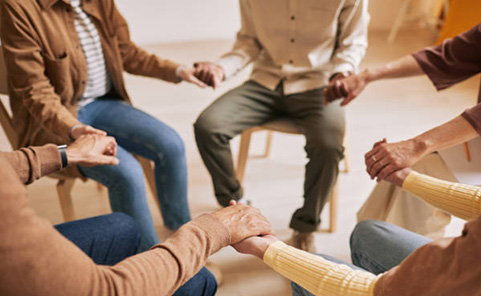If you or someone you love is struggling with drug or alcohol dependence, it may seem like everything feels so hopeless and finding it difficult to know where to start. Although addiction is a disease, it can be effectively treated when evidence-based rehabilitation methods are utilized. Long term recovery from addiction is achievable.
In this guide we detail how an integrated treatment program can encourage you or someone you care about to start and sustain addiction recovery.
What is Addiction Rehab (Rehabilitation)?
Addiction ‘rehab’ is a holistic term that introduces both the therapeutic and medical interventions to treat dependencies on both illegal and legal substance addictions.
Rehab treatments are valuable when they are personalized to your specific needs, and may include inpatient programs, outpatient care, medical detoxes and aftercare.

Facts & Statistics about Addiction in San Gabriel
Prevalence of Substance Use Disorder, by Drug Type
(IN THOUSANDS)
- 2,7578.5%Any Substance
- 2,0886.4%Alcohol
- 1,0683.3%Ilicit Drugs
- 2060.6%Pain Medication
Drug- and Alcohol-Induced Deaths by Age Group, California, 2016
- Alcohol-Induced
- Drug-Induced
- 18 to 250.5
- 9.6
- 26 to 354.3
- 13.9
- 36 to 6424.2
- 22.9
- 65+23.7
- 9.4
Drug Use, by Selected Type and Age Group California, 2015 to 2016
- 12 to 17
- 18 to 25
- 26+
- Marijuana*13.2%
- 34.0%
- 13.5%
- Misuse of Pain Medications3.5%
- 8.0%
- 4.3%
- Cocaine0.8%
- 7.2%
- 1.8%
- Heroin0%
- 0.4%
- 0.2%
What are the treatment options available in San Gabriel?
Integrated treatment is typically the most effective manner in which to deal with the primary causes of drug and alcohol addictions. It is crucial to treat the symptoms of addiction, but coping methods need to be learnt, in order for you to deal with the issues that lead to the drug or alcohol dependency.

Private Residential Programs near San Gabriel
If you reside at the property where you are receiving addiction treatment, you are in a residential program. Its key benefit is the ability to receive holistic treatment and support throughout the day.
There is huge value in taking yourself away from the home environment and becoming fully engaged in the rehabilitation program, because you are not sensitive to the triggering environments that may cause you to abuse drugs. You can finish your rehab program and avoid relapse more effectively when you remain in a controlled environment that is protective and supportive. Residential addiction treatment programs are considered most effective when your substance dependency is chronic or intense, or if you experience co-occurring illnesses or a dual diagnosis.
We understand that the first year of recovery can be crucial and after a residential rehab program, you must remain focused in order to maintain long term sobriety. Upon completion of your residential program, you have to consider what you want from your new life, as you work towards becoming more independent.
Do You Need Help?
Our addiction advisers are here to help you.

Sober Living Programs
Support and guidance are provided during a sober living program to help you navigate your future more effectively. The programs usually have:
- Sending a house manager to check in on you daily
- Fostering the kinds of behaviors that are acceptable in recovery
- Building on supportive and beneficial connections with peers in recovery
Outpatient Programs
Outpatient rehab programs provide flexibility because you can maintain job or life requirements, while attending the rehab center for treatments.
Outpatient programs offer value through:
- Education on abusing drugs
- Group therapy and individual therapy as drivers for therapeutic intervention – You should be enrolled in an outpatient program for a minimum of three months, and may remain in it for a year if required.
Detox Only Programs
A detox program is the first step in drug or alcohol rehab and is performed to break your physical dependency on a substance by removing any trace of it from your system. You will develop withdrawal symptoms as a normal reaction to the absence of substances in your body.
By completing the detox stage you will continue forward in your recovery journey, as you begin addressing the main causes that contributed to your addiction, to help you manage and avoid it in the future. It is likely you will develop withdrawal symptoms and cravings for some time after your detox phase has concluded. Rehab therapy will help you master life-changing skills that are designed so that you limit the risk of relapse.
Paying for Private Treatment
If you make the decision to continue with private treatment, you can use your health insurance to make a claim or pay the costs directly. Many health insurance companies will contribute to some of the costs of a rehab program, which could help with a medical detox, therapy program and aftercare provisions.
The amount of cover you can get will be determined by your provider and the details of your policy. We advise that you double check on how much will be covered for prior to enrolling at the treatment centre. Our Verify Your Insurance page can help you understand how much cover you can claim for.
By not making a claim via your health insurance cover, the financial cost of rehab will need to be covered directly. Some treatment providers may offer payment plans for individuals who may find the costs unaffordable upfront.
State Funded Programs
State-funded addiction treatment programs are recommended to individuals who are motivated to tackle a drug or alcohol addiction but have limited funds to pay privately for a program.
Using funds from a combination of state, federal and Medicaid budgets, these treatment programs remove financial hurdles to treatment by providing:
- Medically supervised drug or alcohol detox
- Rehabilitation services and extended support
State-funded rehab programs are open to people who do not have private health insurance or who reside in low income households. When applying you will need to show:
- Medical records about your addiction issues
- Evidence of where you live
- Proof of what you earn
- Proof that you reside legally in the US
You can learn more about applying by visiting https://www.grants.gov/
This pdf document contains your state agency’s contact details.

The following state-funded addiction rehab programs are available in San Gabriel:
Aurora Las Encinas Hospital
2900 East Del Mar Boulevard, Pasadena, CA 91107
626-356-2650
www.lasencinashospital.comDedicato Treatment Center Outpatients
133 North Altadena Drive, Suite 430, Pasadena, CA 91107
626-460-8119
www.dedicatedtreatment.comHealthRIGHT 360 Prototypes Outpatient Behavioral Hlth
2650 East Foothill Boulevard, Pasadena, CA 91107
626-577-2261
www.healthright360.org
Maintaining Addiction Recovery in San Gabriel
When you leave and complete your treatment programme, you may find it challenging. At rehab you were in a professionally supported, safe environment. When you depart rehab there will be some new challenges that you will have to learn to cope with. Clients who had severe dependencies find long term recovery more difficult when they leave rehab if they do not have a social support structure. Without the relevant support and aftercare to guide you in your new life, relapse is a real possibility.
The following AA/NA meetings are available in San Gabriel:
AA Meeting: The Sewer Group – Redwood City
AA Discussion Meeting and Wheelchair Access:
1190 Veterans Blvd. Redwood City, CA 94063
Saturday: 8:00 PM
https://aa-san-mateo.org/AA - The Hut Speaker Meeting
Open and Speaker:
325 South Pine Street, San Gabriel, CA, 91775
Wednesday: 8:00 pm – 9:00 pm
https://alcoholicsanonymous.com/AA - Roses Road Participation
Open: 535 West Roses Road, San Gabriel, CA, 91775
Tuesday: 7:30 pm – 8:30 pm
https://alcoholicsanonymous.com/
Aftercare & Alumni Programs
An aftercare program continues to provide recovery support when you return to your home environment. Because it’s hard to predict what’s going to happen in life day-to-day, an estimate of 60% of clients in recovery may relapse, this makes extended aftercare an invaluable feature of long-term recovery. When your program is close to finishing, we will discuss the therapies and counseling that are supportive of your long-term recovery and appropriate aftercare provisions will be created to assist you.

One of the many benefits of finishing rehab is the ability to join an alumni community program, where you can liaise with former clients and staff in a community-based project. You will be able to attend special events, take part in a number of initiatives, build connections, and receive advice from other ex-clients who are also in recovery. Plus, you will have the opportunity to offer reciprocal support if you choose to.
Support Groups (Fellowship Meetings)
Through support group meetings you can create a support structure that is important to your long-term sobriety. Support groups like AA (Alcoholics Anonymous) and NA (Narcotics Anonymous) offer regular support with the help of the 12 step principles and local weekly meetings.
You will be empowered from other people’s experiences and share your own at support group meetings. Many individuals in recovery attend local meetings to help them in the early and later stages of addiction recovery. Support groups provide them with the important tools to stay away from substances, allowing them to take responsibility for their own journey in recovery.
Support for Families & Children Affected by Addiction
Some individuals living in an addicted household are damaged more than other individuals. While its true that the individual struggling with addiction certainly needs help and support, other family members also need assistance.
By taking part in family support groups, you can learn to manage stress more effectively, and be able to support your loved one recovering from addiction. Get help and support for the Family with the below support groups:
- Parents of Addicted Loved Ones
- SMART Recovery Family & Friends
- NAMI Family Support Groups
- Al-Anon
- Families Anonymous
- Alateen
- Nar-Anon










